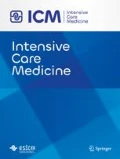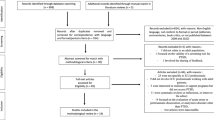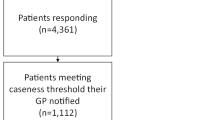Abstract
Objective
To evaluate the effectiveness of the provision of information in the form of a rehabilitation program following critical illness in reducing psychological distress in the patients’ close family.
Design
Randomised controlled trial, blind at follow-up with final assessment at 6 months.
Setting
Two district general hospitals and one teaching hospital.
Patients and participants
The closest family member of 104 recovering intensive care unit (ICU) patients.
Interventions
Ward visits, ICU clinic appointments at 2 and 6 months. Relatives and patients received the rehabilitation program at 1 week after ICU discharge. The program comprised a 6-week self-help manual containing information about recovery from ICU, psychological information and practical advice.
Measurements and results
Psychological recovery of relatives was assessed by examining the rate of depression, anxiety, and post-traumatic stress disorder (PTSD)-related symptoms by 6 months after ICU. The proportion of relatives scoring in the range >19 on the Impact of Events Scale (cause for concern) was high in both groups at 49% at 6 months. No difference was shown in the rate of depression, anxiety, or PTSD-related symptoms between the study groups.
Conclusion
A high incidence of psychological distress was evident in relatives. Written information concerning recovery from ICU provided to the patient and their close family did not reduce this. High levels of psychological distress in patients were found to be correlated with high levels in relatives.
Similar content being viewed by others
References
Jones C, Griffiths RD (1995) Social support and anxiety levels in relatives of critically ill patients. Br J Intensive Care:44–47
Pérez-San Gregorio MA, Blanco-Picabia A, Murillo-Cabezas F, Dominguez-Roldán JM, Sánchez B, Nùñez-Roldán A (1992) Psychological problems in the family members of gravely traumatised patients admitted into an intensive care unit. Intensive Care Med 18:278–281
Jones C, Macmillan RR, Griffiths RD (1994) Providing psychological support to patients after critical illness. Clin Intensive Care 5:176–179
Hentinen M (1983) Need for instruction and support of the wives of patients with myocardial infarction. J Adv Nursing 8:519–524
Thompson DR, Meddis R (1990) Wives responses to counselling early after myocardial infarction. J Psychosom Res 34:249–258
Jones C, Skirrow P, Griffiths RD, Humphris G, Ingleby S, Eddleston J et al. (2003) Rehabilitation after critical illness: a randomised, controlled trial. Critical Care Med 31:2456–2461
Zigmond AS, Snaith RP (1983) The Hospital Anxiety and Depression Scale. Acta Psychiatr Scand 67:361–370
Spielberger CD, Gorsuch RL, Lushene R (1970) State-Trait Anxiety Inventory Manual. Consulting Psychologists Press, Palo Alto, California, 1:20
Horowitz M, Wilner N, Alvarez W (1979) Impact of events scale: a measure of subjective stress. Psychosom Med 41:209–218
Ware JE, Sherbourne CD (1992) The MOS 36-item Short-Form Health Survey (SF-36). I. Conceptual framework and item selection. Med Care 30:473–483
Jones C (2001) Rehabilitation Following critical illness, support for patients. PhD thesis, University of Liverpool, Liverpool, UK, pp 154–156
Jones C, Humphris G, Griffiths RD (1998) Psychological morbidity following critical illness: the rationale for care after intensive care. Clin Intensive Care 9:199–205
Cohen J (1969) Statistical power analysis for the behavioural sciences. Academic Press, New York
Hollis S, Campbell F (2000) What is meant by intention to treat analysis? Survey of published randomised controlled trials. Br Med J 319:670–674
Horowitz M (1986) “Dosing” of trauma: stress response syndromes. Jason Aronson, Northvale, New Jersey, pp 30–33
Mayou R, Foster A, Williamson B (1978) The psychological and social effects of myocardial infarction on wives. Br Med J 1:699–701
Thompson DR, Cordle CJ (1988) Support of wives of myocardial infarction patients. J Adv Nursing 13:223–228
Ehlers A, Clark DM (2000) A cognitive model of posttraumatic stress disorder. Behav Res Therapy 38:319–345
Wilkinson CB, Vera B (1989) Clinical responses to disaster. In: Gist R, Lubin B (eds) Psychological aspects of disaster. Wiley, New York, pp 233–265
Foa EB, Davidson JRT, Frances A (1999) The Expert Consensus Guideline Series: treatment of posttraumatic stress disorder. J Clin Psychol 60 (Suppl 16):1–75
Department of Health (2000) Comprehensive critical care. Department of Health, London, p 23
Author information
Authors and Affiliations
Corresponding author
Appendix
Appendix
The topics addressed in ICU Recovery Manual are as follows: Anxiety; Assessing your life style; Changes in appearance; Depression; Exercises; Feeling jittery; Feeling down; Food; Getting fit again; Getting out and about; Information—after intensive care; Living alone; Medicines; Mobility; Mood changes; Nightmares; Overworking; Panic attacks; Phobias; Relaxation; Sex after serious illness; Sleeping; Smoking; Stress; Stress in marriage; Tiredness; Where to go from here?; Where to start; Worrying.
Rights and permissions
About this article
Cite this article
Jones, C., Skirrow, P., Griffiths, R.D. et al. Post-traumatic stress disorder-related symptoms in relatives of patients following intensive care. Intensive Care Med 30, 456–460 (2004). https://doi.org/10.1007/s00134-003-2149-5
Received:
Accepted:
Published:
Issue Date:
DOI: https://doi.org/10.1007/s00134-003-2149-5




